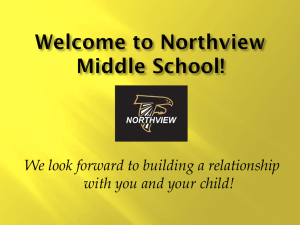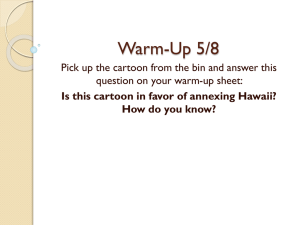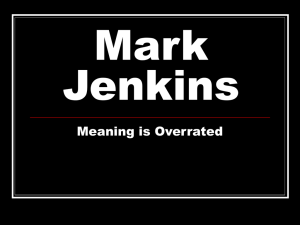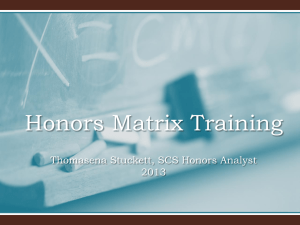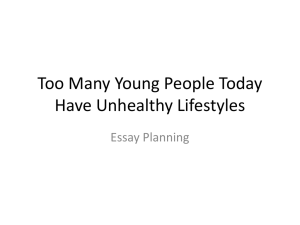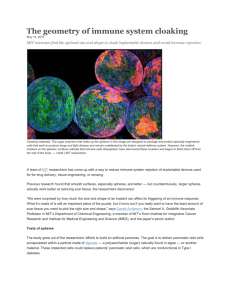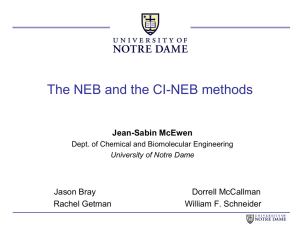File
advertisement
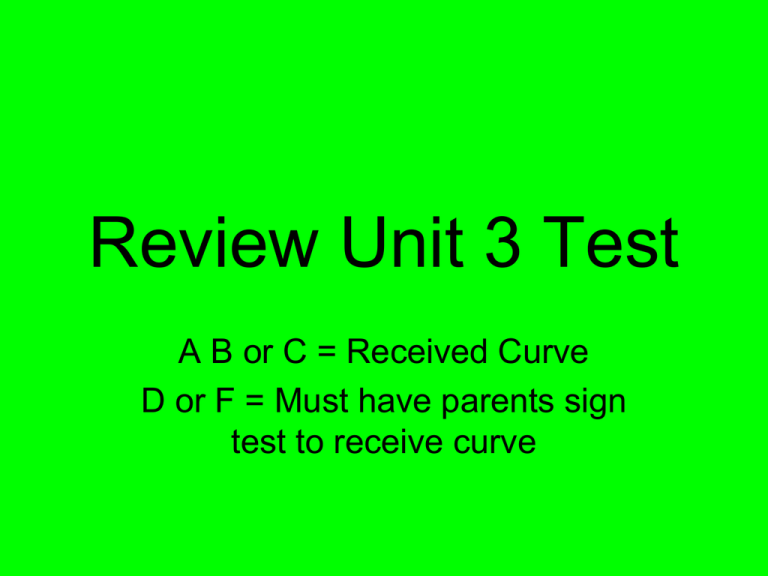
Review Unit 3 Test A B or C = Received Curve D or F = Must have parents sign test to receive curve Unit #4 – Project Citizen: Public Policy • Key Learning – Effective citizens can research issues, form reasoned opinions, support their positions, and engage in the political process Effective governance requires responsible participation from diverse individuals who translate beliefs and ideas into lawful action and policy. Unit #4 Essential Question • How would private citizens and interest groups most effectively communicate with government programs and agencies? How should groups engaged in political activities organize to accomplish their goals? Unit #4 Pre-Test • • • • • • Easy Way or Hard Way? Clear off desks NO TALKING TURN TEST OVER WHEN FINISHED Leave correct answers alone Wrong answers are marked wrong and the correct answer is put to the left of the number Homework • CP #1 – Special Interest Groups • Honors #1 – Read Chapter 10 Sections 1 Concept #1 – Working for Change • Lesson Essential Question #1 – – How should private citizens and interest groups most effectively communicate with government programs and agencies? – How do stakeholders work with the government to influence policy? • Vocabulary Public Policy Special Interest Group Civil Society Are you involved….? • Many teens throughout the US do not feel that they have a voice in public policy decision making. • With a partner come up with a list of 5 reasons for why teens do not feel a part of decision making. • Be prepared to share with class… Are you involved…? 1. 2. 3. 4. 5. CHS Campaign • Completed assignment with a partner • Step #1 – Select an issue affecting teens at CHS • Step #2 – Create a slogan to persuade teens to support your cause • Step #3 – Describe 3 ways in which teens can help support your cause or 3 reasons for why your cause is important (EXTRA CREDIT IF YO COMPLETE BOTH) • Step #4 – Create a final copy • Class work – 25 point assignment Participation • What words or documents emphasize for US citizens to participate? Class work • Complete individually – DO NOT TALK • Read all directions • Use text book to define the first five words in notebook • Read each word or phrase and explain why that word or phrase answers the question in the box Class work • Constitutionalism - adherence to or government according to constitutional principles; • Liberalism - a political philosophy based on belief in progress, the essential goodness of the human race, and the autonomy of the individual and standing for the protection of political and civil liberties; Challenges • What challenges might some citizens face who attempt to communicate with government leaders? – Work individually for a few minutes – Compare responses with a partner • Discuss strengths and weaknesses of answers • Create a top 5 list of answers Challenges List More Challenges • Do not understand how government works • Do not understand who is responsible for different decisions • Do not know how to communicate with elected officials • Do not feel elected officials will listen to them • Do not understand government bureaucracy • Feel overwhelmed by process Exit Ticket • What can be done to increase civic participation among American citizens? Homework • CP #2 – The Bureaucracy: The Real Government • Honors #2 – Chapter 10 Sections 2 & 3 Concept #1 – Working for Change • Lesson Essential Question #2 – – How do stake holders work with government to influence policy? – How should a citizen communicate with a government agency to influence the decisions of that agency? • Vocabulary Bureaucracy Red Tape Spheres of Society • 3 different spheres inside of any society – Private Sphere – Civil Society – Government • With a partner create a list of events that would occur under each branch • Be prepared to share with class Spheres of Society Private Sphere Civil Society Government Spheres of Society 1. A local school board changes graduation requirements. • Government 2. Susan becomes a member of the Girl Scouts. • Civil Society 3. Carmen and her friend go to dinner and a movie. • Private Sphere 4. Marco’s family and friends have a picnic on July 4th. • Private Sphere Spheres of Society 5. Sara and her two sisters join a labor union. • Civil Society 6. The Sierra Club lobbies state legislators to pass environmental protection laws. • Civil Society 7. The state legislature passes a law limiting the use of cell phones while driving. • Government 8. Citizens join a taxpayer’s association in an effort to get government to lower taxes. • Civil Society Spheres of Society 9. The federal government awards a contract to a private company to repair sections of an interstate highway. • Government 10. A city council passes a law establishing smoke free zones in public parks. • Government Class Work • Spheres of Society Worksheet • How Spheres of Society Can Help Solve Community Problems Any Ideas? • Where did the phrase “cut the red tape come from”? • Official government documents were once bound with red twill tape and then stored. If someone wanted to look at the document they would need to literally cut the twill to gain access to the document and its information. Think/Pair/Share 1. Have you ever heard someone mention how frustrated they were by all of the red tape? 2. Why were they frustrated? 3. What did they mean by the phrase red tape? 4. What is meant by government bureaucracy? 5. Have you or your family had any personal experiences with this? Class Activity • STUDENTS, ENGAGE! Homework • CP #3 – Study for Quiz; Read Political Parties • Honors #3 – Study for Quiz; Read Chapter 8 Section 1 Exit Ticket • Why is it important for citizens to understand that there are different levels of government authority? Explain your answer. QUIZ Unit #4 Concept #1 – Working for Change Reading Activity • Work Independently and Quietly Homework • CP #4 – Read How do citizens connect with their government? • Honors #4 – Chapter 8 Sections 2 & 3 Exit Ticket Concept #2 – Political Parties • Lesson Question #1 – – What is the purpose, structure and function of political parties? – How does one get involved with a political party? • Vocabulary Watch dog Two-party system Ideology Convention patronage party machine Political Parties • What roles do political parties play in our political system? • Work with a partner to come up with 5 roles that political parties play. • Be prepared to share with class. Political Parties 1. 2. 3. 4. 5. Political Parties What is a political party? - groups of people who share similar beliefs about how the government should be run and how the issues facing our country should be solved Political Parties Why organize into a political party? - people have more power to make voices heard than acting alone 5 Roles of Political Parties 1. Nominate Candidates • • Responsible for selecting candidates who will run for office Represent party’s members and spread party’s message 5 Roles of Political Parties 2. Influence Policy – Congressmen work to pass laws that support party’s platform – Laws passed affect policies of government 5 Roles of Political Parties • Unite Government 5 Roles of Political Parties 4. Create Balance – – most powerful = most members elected – Majority – party can focus government on party’s platform – Minority – party works to oppose majority and keep it in check 5 Roles of Political Parties 5. Inform Citizens – Campaigns for citizens – TV, pamphlets, blogs, speeches – Biased information The Party Platform • Parties need simple way to express beliefs • Take complicated issues and create understandable statements • Keep statements broad and simple – Attract more supporters Platform Issues • Which political party best matches the issues below? – Supports right to abortion – Against Patriot Act – Against same-sex marriage – Supports taxes on wealthy – Supports lower defense spending – Against universal health care – Stricter immigration laws Influence of Political Parties on Policy • Organize people that can put pressure on their legislators to impact public policy • Bring officials on the local, state and national level together to communicate about common goals • Support candidates’ platforms and make sure that elected officials follow through on supporting party’s platform How many parties are there? • Single-party system – – One major political party – Not considered democracies – Name a country who would match…. How many parties are there? • Two-Party System – 2 Major parties hold all power – 3rd parties exist – Name a country who would match…. How many parties are there? • Multi-Party System – – 3 or more political parties – No parties gain control of government – Name a country that would match…. Strength or Weakness 1. There are too few parties for citizens to choose from. 2. The public has almost no voice. 3. Party platforms must appeal to so many people that party members can’t agree on core beliefs. 4. Parties have to work together to get things done. 5. More parties have a say in government so everyone can join a party they believe in. Strengths or Weaknesses 6. There is no opportunity for opposing views to be represented. 7. Too many parties create divisions and make it hard for the government to accomplish reform. 8. The government can easily accomplish its goals because there is no opposition. 9. Encourage parties to create broad platforms that include many types of voters. Review • Complete rest of worksheet individually and quietly Political Spectrum • Read Page one as class – Volunteers? • Complete pages 2 & 3 individually and quietly Homework • CP #5 – Read Policy Making: Political Interactions • Honors #5 – Read Policy Making: Political Interactions Exit Ticket • Explain the relationship between citizens, political parties and the government. Unit #4 Project Citizen – Public Policy • Concept #3 – Getting Involved • Lesson Essential Questions – – How should groups engaged in political activities organize to accomplish their goals? – How does one get heard by a commission examining public policy? – What is a citizens’ group and how do they operate? Opener • Joseph Joubert (1754-1824) – “It is better to debate a question without settling it than to settle a question without debating it.” 1. What does it mean to DEBATE something? 2. What does it mean to SETTLE a debate or argument? 3. What does the first ½ of the statement mean ‘To debate a question without settling it’? 4. What does the second ½ of the statement mean ‘To settle a question without debating it?” Up for Debate Homework • CP #6 – Study for Unit #4 Test; Finish Project • Honors #6 – Study for Unit #4 Test; Finish Project Exit Ticket • Select an issue that affects your daily life. How would you go abut getting involved to bring about change to that specific issue? CP Unit #4 Questions • • • Think back to the political ideology quiz you took at the beginning of the year. Which group do you belong to – Liberal, Conservative, Moderate, or something in between? Why do you think you belong to this group? Where did your beliefs come from? (10 Points) Explain the 5 roles of a political party. (10 Points) Select an issue that affects your daily life. How would you go abut getting involved to bring about change to that specific issue? (5 Points) Honors Unit #4 Questions • • • • • • Think back to the political ideology quiz you took at the beginning of the year. Which group do you belong to – Liberal, Conservative, Moderate, or something in between? Why do you think you belong to this group? Where did your beliefs come from? (10 Points) Explain the 5 roles of a political party. (10 Points) Why do teenagers feel such a disconnect with the government and public policy decision making? (5 points) Select an issue that affects your daily life. How would you go abut getting involved to bring about change to that specific issue? (5 Points) What can be done to increase civic participation among American citizens? (5 points) What does the phrase “cut the red tape” mean? Where did it come from? (5 points) Test Unit #4: Project Citizen – Public Policy Homework #7 • FINISH PROJECT Reading Activity Work Independently and Quietly Homework #7 • FINISH PROJECT Projects Due Constitution Project

